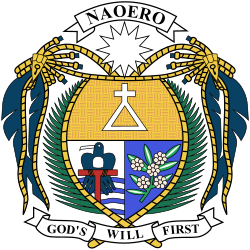 |
|---|
Elections for the Local Government Council were held in Nauru in late 1963. [1] All nine incumbent councillors were re-elected. [1]
 |
|---|
Elections for the Local Government Council were held in Nauru in late 1963. [1] All nine incumbent councillors were re-elected. [1]
Of the eight constituencies, only two, Meneng and Anabar, were contested. The Meneng Constituency had two candidates, James Ategan Bop and James Aingimea, run for one open seat. The Anabar Constituency had three candidates, Agoko James Doguape, Jerry Ainungom Waidabu and Peter Gadaroa. In the other constituencies the sole candidates were elected unopposed. [2]
| Constituency | Elected member | Notes |
|---|---|---|
| Aiwo | Raymond Gadabu | Re-elected |
| Anabar | Agoko Doguape | Re-elected |
| Anetan | Roy Degoregore | Re-elected |
| Boe | Hammer DeRoburt | Re-elected |
| Buada | Austin Bernicke | Re-elected |
| Meneng | James Ategan Bop | Re-elected |
| Ubenide | Buraro Detudamo | Re-elected |
| Victor Eoaeo | Re-elected | |
| Yaren | Joseph Detsimea Audoa | Re-elected |
| Source: Department of External Territories [3] | ||
In December 1964, there was a by-election to fill a vacancy in the Local Government Council caused by the death of Councillor Raymond Gadabu. In the four-way contest, Edwin Tsitsi was elected. [4]